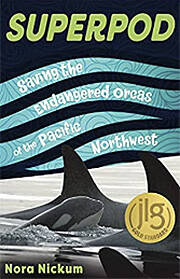There may be no more iconic resident of the Salish Sea than the southern resident orcas, and they are in dire straits with regard to their future.
In the past 10 years, their numbers have declined to 73 in the J, K and L Pods that frequent Washington waters.
In response, Gov. Jay Inslee created the Southern Resident Orca Task Force in 2018. That’s when Nora Nickum entered the scene.
Nickum is the Senior Ocean policy manager at the Seattle Aquarium, and a former facilitator for the task force. She grew up on Bainbridge Island, and describes her childhood memories of the shores of Puget Sound, searching for (and sometimes sighting) orcas as some of her most-formative ones.
Nickum attended Bainbridge High School, but traveled to Northfield, MN to major in Latin American Studies at Carleton College. She said she had always felt a strong need to improve the community and lives of others, which initially drew her into labor rights advocacy during time spent in Ecuador. Given her tendency toward equity and social justice, it’s not surprising that she received her masters in public policy from the Harvard Kennedy School.
Nickum said her commitment to improving things wasn’t limited to the human world. It became clear that perhaps the most pressing issue on the planet was climate change, which seemed to have downstream effects on not only Latin American workers, but southern resident orcas too, and every other aspect of her beloved Puget Sound.
That realization nudged her toward the environmental advocacy realm, and eventually into contact with the task force. She had always thought that to participate in an endeavor like saving the whales, one would have to be a scientist. But she found out she was prepared to contribute just as much by developing public policy that might aid and sustain the entire ecosystem, and ultimately the orcas.
She combined that love in publishing her first book in April, “SUPERPOD,” a nonfiction introduction to the orcas. She has been writing for youth periodicals for some time, but the book talks of efforts to save orcas from extinction, and the people who are fighting for them. It’s aimed at children from 8 to 12 but said anyone might find the book interesting.
Nickum decided on writing children’s books because of experiences with her own daughter. When reading to her, especially about Puget Sound, she felt compelled to do something to preserve the natural environment for coming generations. She felt a need to communicate that humanity is not separate from the natural world, and that helping people understand that would improve the way they take care of it. Nickum understood that children, because of their curiosity, openness and keen perception, are the best ambassadors for that, and that they’re an audience worth addressing.


